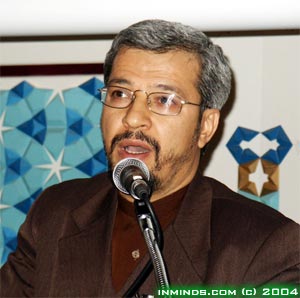| |
|
OPEN
TO QUESTION

Hujjatul
Islam
Dr.Saied Reza Ameli
FOUNDER,
INSTITUTE OF ISLAMIC STUDIES
Interviewed on 22th September 2001
Saied Reza
Ameli was a student in the United States, studying Mechanical
Engineering when the events of the Islamic Revolution happened.
He left his studies and rushed home to join the Revolution.
There he took up Islamic Studies, studying at the Howzeh Elmiyyeh
in Qum for twelve years. Simultaneously he also obtained a BA
in Sociology at the University of Tehran. And since has obtained
a MA and Ph.D. in the UK in the field of Sociology of Culture
and Mass Media with regards to Globalisation and Muslim Identity.
In the UK he helped establish the Islamic Centre of England
and later founded the Institute of Islamic Studies.
|
"We
don't have community, the community is based on leadership
- which we don't have in the west. This is the first important
element of a community. Society is based on diversity and
when diversity is there, then it should come to unity somehow.
The only thing that can bring diversity to unity is leadership,
this is something we are seriously lacking in our society
in Britain."
|
|
"
More than 40% of young Muslims in Britain choose non-Muslims
as their best friend.
Why?
When I asked them what is your criteria for choosing a best
friend?
Is it religion?
Is it culture?
Or you don't consider religion as a criteria?
More than 50% said that 'we do not consider religion as
a value for choosing a friend'.
...
If members of a community cannot consume the culture of
the community then that community will be weak, and the
other culture that is consumed is then strengthened.
This a very serious consideration for the future of the
Muslim community in Britain"
|
|
"
Jalal al-I Ahmad said
'One day Islam will rise from the West',
and I think this is the time, and you can see that so far
we have 50 million Muslims in the West - this a very important
community. I think if there is any chance for the future
that we can again have a global Islam all over the world
then it is at the time of Globalisation. "
|
Back
to OPEN TO QUESTION Home
|
|

